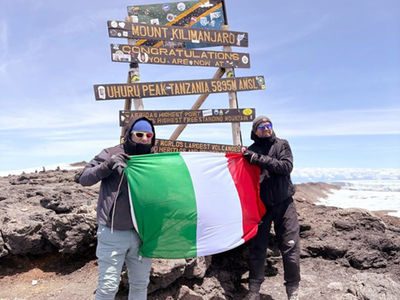
Sometimes, all it takes for men to bond is a glass of bourbon or a shared passion for a football team.
For Italian friends Paolo Paolini and Fabio Santoni, it was their mutual love for hiking that cemented their friendship. When Paolini arrived in Tanzania in August 2024, he discovered that Fabio had already climbed Mount Meru.
Soon after, they began planning to conquer Mount Kilimanjaro together. By February 2025, their plan had taken shape, and they contacted a specialist company to organise the climb.
Paolini, an active man who keeps himself in good physical form, intensified his training regimen. His preparation included playing football twice a week and paddling every weekend.
“The days I didn’t spend on the pitch, I was in the gym, following a specific programme prepared by Nino, one of my elder sons,” he said.
Beyond physical readiness, Paolini found mental preparation to be even more crucial.
As it is impossible to simulate the high altitude or predict how the body will react at over 4,000 metres above sea level, he said, “Mentally, I was going through different scenarios, focusing on reaching the summit, but none of these scenarios had the option of failure.”
Scaling the world’s highest free-standing mountain demands both respect and awareness of the challenge that lies ahead. Paolini was born in Switzerland, and at the age of three, his father placed him on skis and told him to follow.
“I grew up near the Swiss Alps and also in my region in Italy—Friuli-Venezia-Giulia, in the north-eastern part close to Austria and Slovenia—which has beautiful landscapes and mountains. I would say that I just love everything that has to do with mountains,” he said.
Hiking, to him, is deeply sentimental—it means spending quality time with family and friends. While Kilimanjaro was a significant challenge, Paolini regarded it as a “normal” hike for someone raised among snowy peaks.
“To me, hiking means relaxing, enjoying nature, and recovering from the usual stress—and, if possible, rewarding myself with delicious food and an ice-cold beer afterwards,” he added with a laugh.
Nevertheless, climbing Kilimanjaro allows no comfort.
“No shower, very little contact with family and friends for seven days. But more or less, you are prepared for it,” he noted.
For him, the most challenging part was not knowing whether mountain sickness would affect him.
“There are many possible symptoms, some of which can be severe,” he said. “Luckily, I only had headaches on the second and third day.”
During the final 150-metre stretch from Stella Point to Uhuru Peak, Paolini struggled slightly with shortness of breath, but adrenaline—and the sight of the summit so close—pushed him through the final steps.
“I feel blessed and proud to have reached the top of Africa with my buddies, and especially with my son Luis,” he said.
He proved to himself that with the right physical and mental preparation, one can go beyond their limits.
“But I think, in general, my biggest life challenge is to give a proper education to our children and do everything I can to see them happy,” he reflected.
Paolini finds time for holidays whenever schedules align. “It’s all about time management,” he said, adding that compromises with his wife and family make it possible. Married for 25 years, he knows his spouse very well, and they both understand each other’s needs.
He cherishes their alone time together. “For example, a fixed point in our daily schedule is the coffee we take together every single day when I return from work. It’s just 30 minutes, but this time belongs only to us.
Or the daily walks with our dogs every morning at 6.00 a.m. This early morning exercise and chat are good for our bodies and souls,” he elaborated.
For Santoni, climbing Kilimanjaro was an adventurous goal he set before moving to Tanzania for work.
“I was thinking with my wife about reaching the summit of this huge and famous mountain before starting work in Tanzania,” he recalled.
When he first met Paolini at an event in Dar es Salaam, they quickly realised they shared the same ambition.
To prepare, Santoni walked several times over medium distances—between 12 and 14 kilometres—along the seaside promenades in Dar es Salaam.
He also ran outdoors for about 10 kilometres once or twice a week and trained on the treadmill at the gym.
His passion for trekking began years earlier in Italy when he explored routes in the Tuscan Apennines with friends.
He realised that reaching mountain summits gave him a profound sense of freedom, and the grandeur of nature always rewarded him with a special gift each time he reached the top.
During his Kilimanjaro ascent, Santoni encountered difficult moments due to the altitude. The most challenging part, he said, was climbing at night as they neared Stella Point (5,756 metres).
“I started feeling dizzy, my legs were very weak, and I was breathing heavily. It was a kind of mountain sickness, as climbers call it,” he said.
Despite his struggle, he persevered. Slowly but surely—polepole, as Tanzanian guides often advise—he reached the summit. “My greatest strength during the ascent was my mind and soul,” he said.
Santoni does not view the climb as a conquest of Africa’s highest mountain but rather as overcoming a personal challenge.
He pushed his body and endurance to the limit in conditions he had never experienced before, especially at such altitude. To him, travel is never a waste of money or time. “It’s one of the best investments you can make in yourself. I will never stop travelling,” he said.
Having moved to Tanzania more than a year ago, this is Santoni’s first time in Africa. Initially, everything was very different from Italy and Europe, but he soon grew fond of life in Dar es Salaam. “The view of the sea—the Indian Ocean—makes me feel good and peaceful,” he said.
Since his arrival, he has visited Arusha, Iringa, Moshi, Morogoro, and Zanzibar.
“I’ve been on exciting safaris to Serengeti, Tarangire, Ngorongoro, Mikumi, and Ruaha. I also climbed Mount Meru,” he said proudly.
These travels have revealed to him that Tanzania is an extraordinary and vast country, blessed with abundant nature and wildlife.
“People here are always smiley and friendly,” he observed.
Such experiences have taught him that happiness often comes from simplicity. “People can live in an easy way and still be happy,” he said.
However, being far from home sometimes leaves him nostalgic. “Being abroad for work offers great opportunities, but there are also things about normal life in your home country that you miss—like being with your family or friends,” he admitted.
“My remedy is to play padel as much as possible,” he added with a grin. Above all, he recommends a Tanzanian safari to anyone seeking an unforgettable encounter with nature.
“I would definitely tell my friends and family to come, because it’s an amazing experience with nature and animals that you’ll never forget,” he said.
“Even though I’ve just started going on safari here, I think Tanzania is one of the best places in Africa to experience wildlife, beautiful landscapes, and excellent service from expert and knowledgeable guides,” he affirmed.Read More




